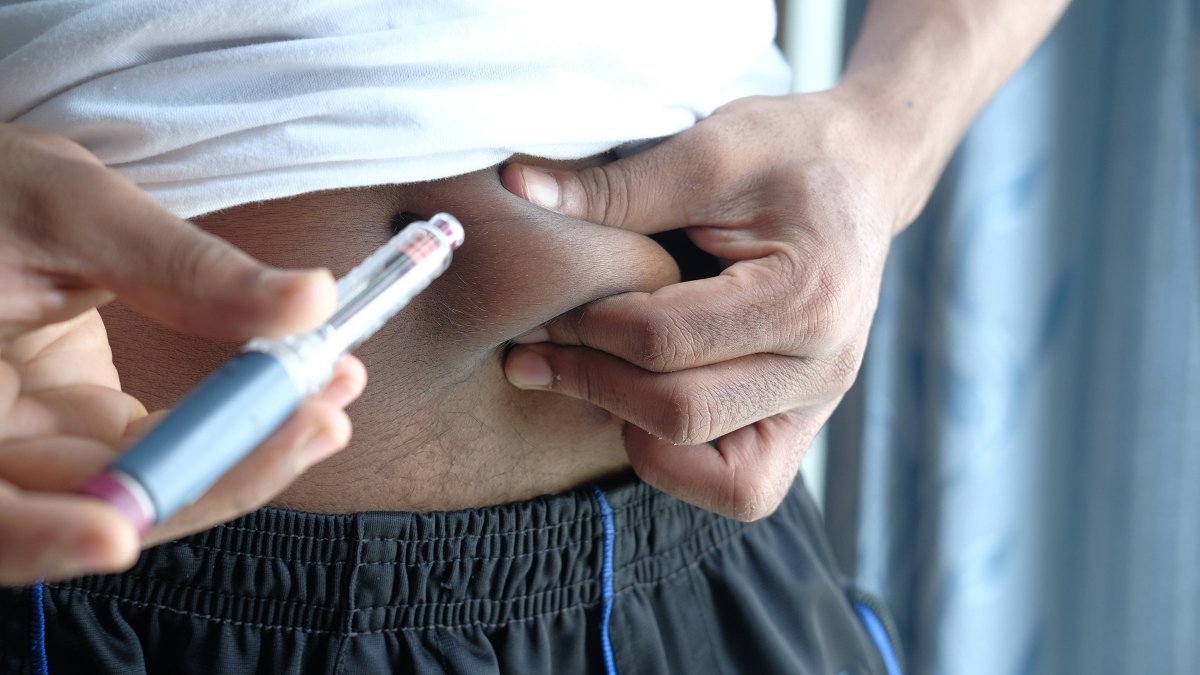Best Place To Inject Saxenda: Optimal Administration Tips
Are you ready to take control of your weight loss journey? If so, Saxenda may be the solution you've been searching for. However, proper administration is crucial to ensuring its effectiveness.
Like an archer aiming at a bullseye, injecting Saxenda in the right place is key to hitting your weight loss goals. Think of it like planting a seed in fertile soil. You want to give that seed the best chance possible to grow and flourish, which means choosing the optimal injection site for Saxenda.
But where exactly is that? In this article, we'll guide you through everything you need to know about the best place to inject Saxenda and how to administer it with ease and confidence.
So let's dive in!

Key Takeaways
- Proper administration of Saxenda is crucial for its effectiveness in weight loss.
- Injection sites for Saxenda should be rotated and never injected into areas that are bruised or tender.
- Choosing the right needle size is important in administering Saxenda correctly, especially for those with thicker skin or more subcutaneous fat.
- Before injecting Saxenda, the injection site should be cleaned with an alcohol swab and the medication should be prepared by removing the cap and attaching a new needle to the pen.
Learn About the Injection Sites
So, where should you stick that needle? Let's talk about the best injection sites for Saxenda.
Common injection mistakes can lead to pain and discomfort, so it's important to know where to inject properly. The recommended areas are the abdomen (stomach), thigh, or upper arm.
Choosing the right needle size is also crucial in administering Saxenda correctly. The pen comes with a 4mm needle, which is recommended for most patients. However, if you have thicker skin or more subcutaneous fat in your injection site area, a longer needle may be necessary. Your healthcare provider can help you determine the appropriate length for your needs.
Remember to rotate injection sites and never inject into areas that are bruised or tender. Understanding the injection process can help make it less intimidating and ensure that you're getting the most out of your medication.
In the next section, we'll discuss how to properly prepare and administer Saxenda for optimal results.
Understand the Injection Process
Before injecting Saxenda, it's important to prepare your injection site by cleaning the area with an alcohol swab.
Next, you'll need to prepare your medication by removing the cap and attaching a new needle to the pen.
Finally, when it's time to inject, hold the pen at a 90-degree angle against your skin and push down on the plunger until all the medication has been administered.
Remember to rotate injection sites and dispose of used needles properly.
Prepare Your Injection Site
First, find a fleshy and flat area on your abdomen to prepare the injection site for Saxenda. Make sure the area is clean and dry before proceeding.
Wash the area with soap and water, then gently pat it dry with a towel. Avoid using alcohol or other antiseptics as they can cause irritation.
It's important to avoid areas of your skin that are red, bruised, or tender as these could increase the risk of bleeding or infection. Once you've identified a suitable spot, use an alcohol wipe to clean a small circle around the injection site.
Let it air dry for about 15 seconds before proceeding to prepare your medication. With proper preparation of both your skin and medication, you'll have a safe and effective injection experience!
Prepare the Medication
Now it's time to get your medication ready by removing the cap from the Saxenda pen and screwing on a new needle until it's tight. Ensure that you have the correct Saxenda dosage as prescribed by your healthcare provider.
Once you've screwed on the needle, remove the outer and inner caps of the needle. Do not touch or bend the needle.
Before injecting Saxenda, make sure that it has been stored properly according to its instructions. It should be kept in a refrigerator at a temperature between 36°F to 46°F (2°C to 8°C) until you're ready to use it. If necessary, you can take it out of the fridge and let it reach room temperature for about 30 minutes before using it.
Once you have prepared your medication and injection site, you're ready to inject Saxenda.
How to Inject Saxenda
To properly inject Saxenda, it's important to hold the pen at a 90-degree angle to your skin and use a quick, firm motion to insert the needle into your injection site. This will ensure that the medication is delivered effectively and reduces any pain or discomfort during administration. It's also important to rotate injection sites to avoid irritation or scarring.
Before injecting Saxenda, make sure you have set the proper dosage on the pen based on your doctor's instructions. The injection frequency may vary depending on your individual treatment plan. Refer to this table for guidance:
| Dosage | Injection Frequency |
|---|---|
| 0.6mg | Once daily |
| 1.2mg | Once daily |
| 1.8mg | Once daily |
| 2.4mg | Split into two doses |
By following proper injection techniques and maintaining consistent usage of Saxenda, you can maximize its weight loss benefits as part of a comprehensive treatment plan prescribed by your healthcare provider.

Follow Proper Injection Techniques
Ensure that you're using proper injection techniques when administering Saxenda to optimize its effectiveness. Here are three tips to follow:
-
Use a proper needle: It's important to use the correct needle size and length for Saxenda injections. This will ensure that the medication is delivered into the subcutaneous tissue, where it can be absorbed properly. Consult with your healthcare provider or pharmacist to determine which needle size and length is appropriate for you.
-
Safe disposal: After administering your Saxenda injection, dispose of the needle safely in a sharps container or other appropriate disposal method to avoid accidental injury or contamination.
-
Rotate injection sites: To prevent irritation or discomfort at the injection site, rotate your injection sites regularly, such as moving from one side of your abdomen to the other. This can also help prevent lipoatrophy, which is a loss of fat tissue at the injection site.
By following these proper techniques, you can minimize potential risks and maximize the benefits of Saxenda injections.
As with any medication, there may be some side effects associated with Saxenda injections. In the next section, we'll discuss how to manage these side effects and continue on track with your weight-loss journey.
Manage Injection Side Effects
Managing injection side effects is essential for a smooth weight-loss journey with Saxenda. Coping strategies can help you deal with the common reactions that may occur after administering the medication. Some of these side effects include nausea, vomiting, diarrhea, constipation, and stomach pain.
One way to cope with these symptoms is by adjusting your diet. For instance, eating small meals throughout the day instead of three large ones can help ease nausea and vomiting. Additionally, including fiber-rich foods in your diet can relieve constipation and diarrhea. It's also crucial to stay hydrated by drinking plenty of water or other fluids.
Another effective coping strategy is to exercise regularly. Physical activity can help alleviate some of the gastrointestinal discomfort associated with Saxenda injections. However, it's essential to start slow and gradually increase intensity as you become more comfortable with exercising.
Remember that managing injection side effects is part of the process when using Saxenda for weight loss. By adopting coping strategies such as adjusting your diet and exercising regularly, you can minimize discomfort and focus on achieving your health goals effectively.
In the next section, we'll discuss how monitoring your progress can further support your weight-loss journey with Saxenda.
Monitor Your Progress
As you continue your weight-loss journey with Saxenda, it's important to monitor your progress regularly to stay motivated and on track. Tracking your results can help you see the positive changes happening in your body and give you the motivation to keep going. You should measure your weight, waist circumference, and body mass index (BMI) regularly.
Adjusting dosage may be necessary if you are not seeing results or experiencing side effects. You should consult with your doctor before making any changes to your dosage. If you have been using Saxenda for several weeks without seeing any significant weight loss, increasing the dosage may be necessary. On the other hand, if you are experiencing severe side effects such as nausea or vomiting, reducing the dosage may be necessary.
Monitoring your progress is an essential part of using Saxenda for weight loss. By tracking your results and adjusting dosage when necessary, you can maximize the benefits of this medication while minimizing its potential side effects. Remember that everyone's weight loss journey is different, so don't get discouraged if it takes longer than expected to reach your goals. Keep monitoring your progress and working closely with your healthcare provider to achieve success in a safe and healthy way.
| Measurements | Frequency | Record Keeping | ||||
|---|---|---|---|---|---|---|
| Weight | Weekly | Journal/ App | ||||
| Waist | Biweekly | Measuring Tape | ||||
| BMI | Monthly | Calculator | Blood Pressure | Biweekly | Blood Pressure Cuff |
Frequently Asked Questions
How long does it take for Saxenda to start working?
You may start noticing the effects of Saxenda within a few weeks of starting it. The timeframe for Saxenda effectiveness varies based on your body's response. Proper injection techniques, such as rotating injection sites, can help improve its effectiveness.
Can Saxenda be injected in other areas besides the recommended injection sites?
You shouldn't inject Saxenda in areas other than the recommended injection sites. Doing so can cause potential risks like skin reactions or decreased effectiveness of the medication. Stick to the recommended sites for optimal results.
Is it safe to use Saxenda while pregnant or breastfeeding?
Although Saxenda is not recommended for use during pregnancy or breastfeeding due to safety concerns, there may be alternative options available. Consult with your healthcare provider to determine the best course of action.
What should I do if I miss a dose of Saxenda?
If you miss a dose of Saxenda, take it as soon as possible. If it's already close to the time for your next dose, skip the missed one and makeup dose. Side effects may occur if you take too much at once.
Does Saxenda interact with any other medications or supplements?
Possible interactions and dosage adjustments may occur when taking Saxenda with other medications. It is important to inform your healthcare provider of any supplements, including herbal ones. Saxenda and herbal supplements may require additional monitoring or dosage adjustments – speak with your healthcare provider for more information.
Conclusion
Congratulations! You've now learned about the best place to inject Saxenda and optimal administration tips. By understanding the injection sites, process, and techniques, you can ensure a safe and effective treatment for your weight loss journey.
Remember to manage any potential side effects by following your healthcare professional's advice and monitoring your progress.
Just as a gardener tends to their plants, you must tend to your body with care and consistency. With patience and dedication, like a seed growing into a flower, you too can see positive results from Saxenda injections.
Keep up the good work!




